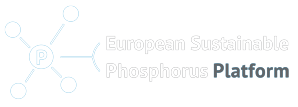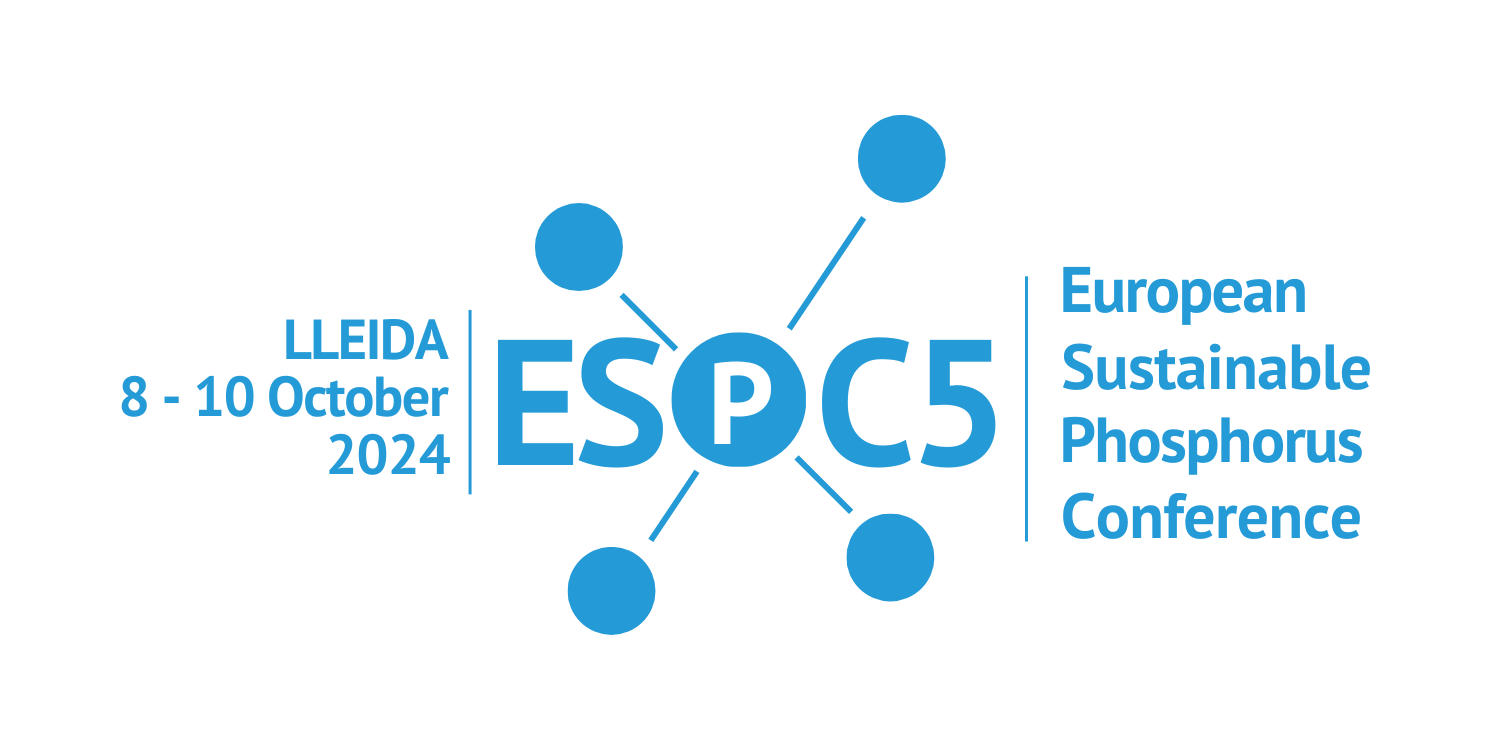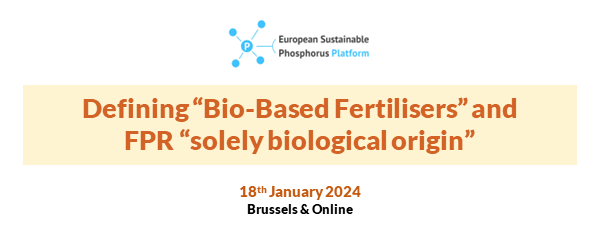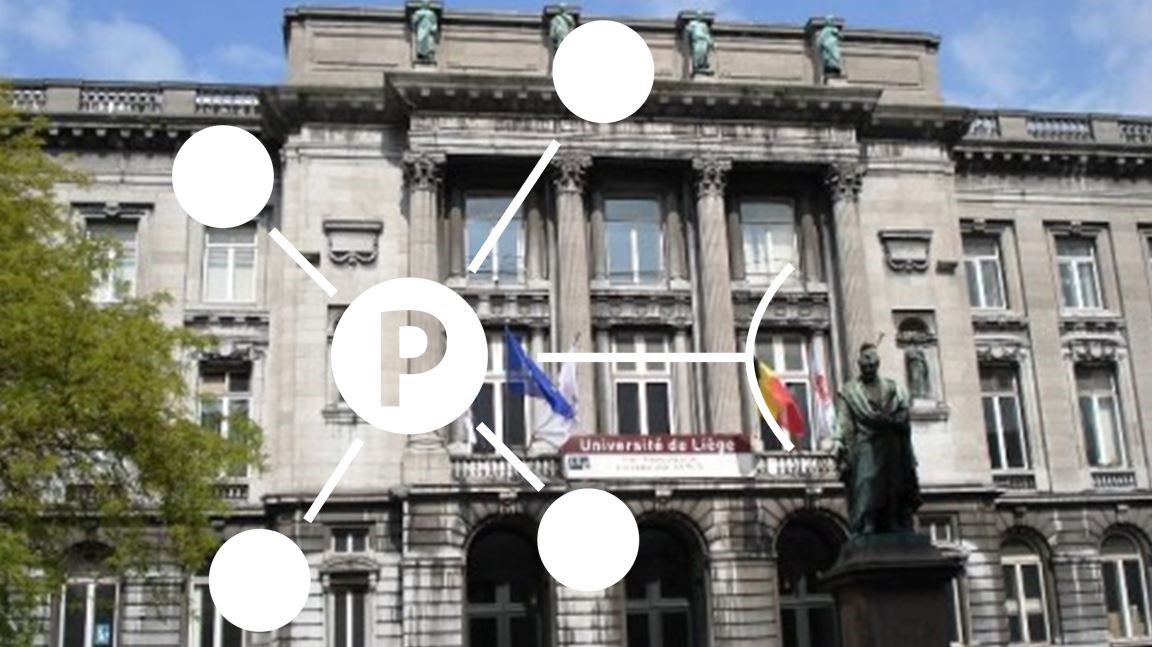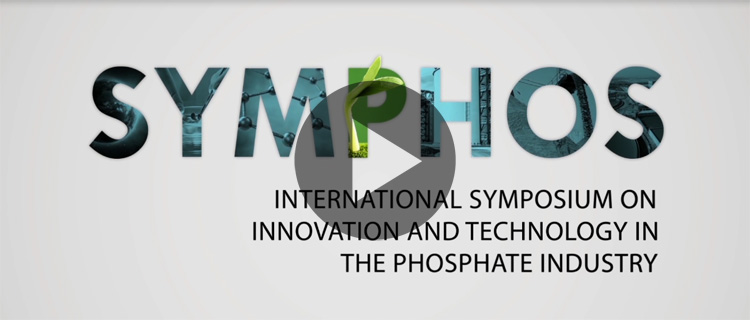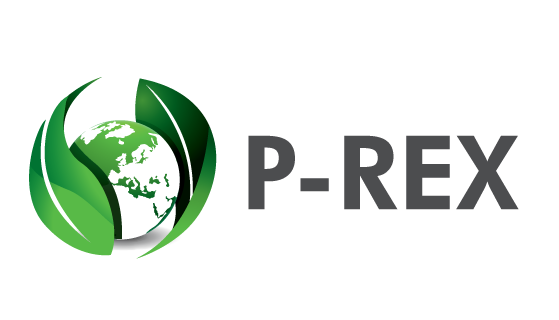Spotlight
ESNI-NERM
 The European Sustainable Nutrient Initiative (ESNI) Conference and the Nutrients in Europe Research Meeting (NERM) are merging into a single reference meeting to put together all the community working on research and innovation focused on nutrient management.
The European Sustainable Nutrient Initiative (ESNI) Conference and the Nutrients in Europe Research Meeting (NERM) are merging into a single reference meeting to put together all the community working on research and innovation focused on nutrient management.
The joined ESNI-NERM Conference will be organised on 28 and 29 April 2026 at Ateliers des Tanneurs in Brussels and aims to showcase the latest research and demonstration outcomes in nutrient management and nutrient recycling. Learn more
ESPP at CRU Phosphates + Potash 2026
Join Robert van Spingelen, ESPP President, and Willem Shipper, Willem Schipper Consulting, at the upcoming CRU Phosphates + Potash Expoconference, Paris (France), 13-15 April 2026. They will give a presentation on "Elemental Phosphorus (P4) Markets: End-Uses, Supply Bottlenecks, and European Project Pathways".
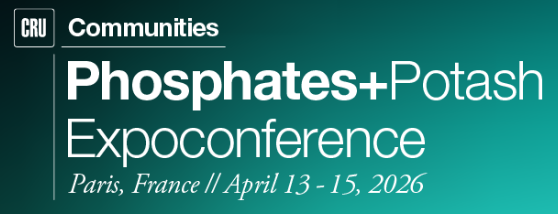
Implementation of EU UWWTD art. 20: P reuse and recycling rates
ESPP workshop to input to the development of proposals for phosphorus “reuse and recycling rates” from sewage, update on P-recover, with participation of the European Commission Joint Research Centre (JRC). Madrid, 8-9 June 2026, with site visits. Learn more here.
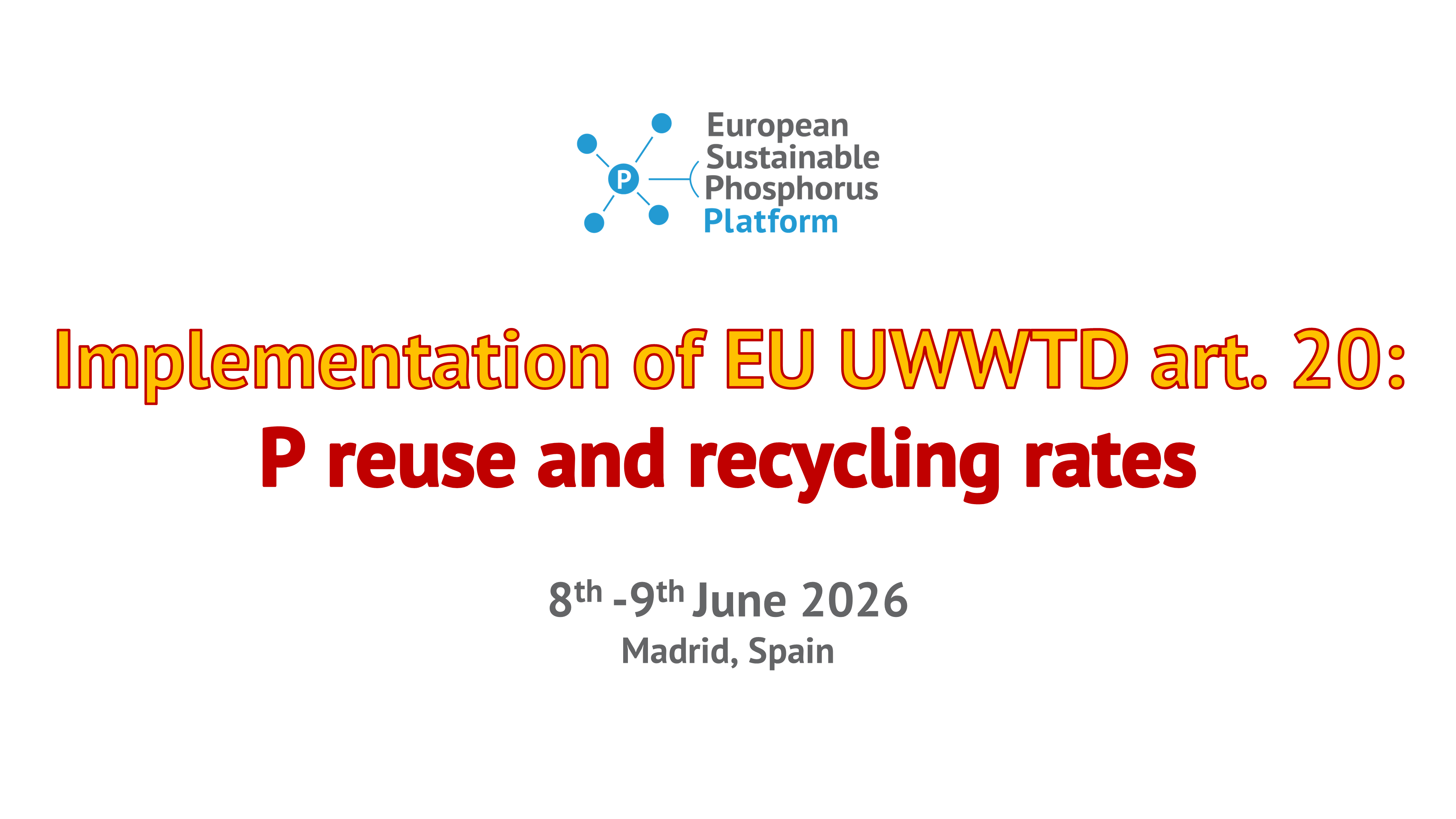
ESPP workshops on phosphorus as a Critical Raw Material and on White Phosphorus
ESPP is organising a two-day event dedicated to nutrient security and phosphorus criticality in Europe, in Brussels and online, 19-20 November 2025:
- 19 November 2025: workshop on Phosphate – an EU Critical Raw Material, key to food security and agricultural resilience, discussing nutrient supply security, recycling, and the role of the next EU Common Agricultural Policy (+ ESPP General Assembly, members only)
- 20 November 2025: workshop on P4 (white phosphorus) and its importance for Europe’s strategic industries, from fire safety and semiconductors to renewable energy and aerospace, in the context of the EU Critical Raw Materials Act.
The event will bring together experts, policymakers, and stakeholders to debate how Europe can ensure secure and sustainable access to essential nutrients and phosphorus materials.
Limited places available in Brussels. All details here.
Sign the joint stakeholder call for nutrients in the EU Circular Economy Act
The EU Circular Economy Act is currently under preparation. This will be the first EU legal Act (Parliament and Council) for circularity and recycling, replacing the Commission’s Circular Economy Action Plans 1 and 2, and is has been announced as part of the new Commission’s Clean Industrial Deal (see below).
Now is the time to input to this proposed Act, which is expected to include changes to Waste legislation, Public Purchasing, producer responsibility, and aims to boosting consumer demand for recycled materials.
ESPP has prepared detailed technical input, addressing nutrient circularity in a wide range of regulations and policies www.phosphorusplatform.eu/regulatory
All organisations are invited to co-sign the 1-page “joint call for nutrients in the EU Circular Economy Act” www.phosphorusplatform.eu/regulatory. To sign this joint call, contact ESPP, specifying your organisation name, signatory contact, logo.
Nutrients in aquaculture and fisheries
10-12 June 2025, Bergen (Norway) & online. ESPP workshop, with partners in Norway and with UNEP uPcycle, on nutrient management in aquaculture feed, seafood processing and fish sludge valorisation, Norway & online, covering nutrient flows, environmental best practice, phosphorus recycling, regulatory challenges. With confirmed participation of the European Commission (DG MARE and DG SANTE), key aquaculture industry players (fish farmers, feed suppliers), major R&D initiatives and networks, and also of UNEP and the Norway authorities. The workshop will contribute to the United Nations (UNEP) project uPcycle, leading to a UNEP white paper on phosphorus sustainability in aquaculture. Site visits to National Algaepilot Mongstad and Lerøy Seafood fish farm with sludge recovery in Skaftå.
The workshop is a EU GREEN WEEK PARTNER EVENT and is organised with the support of the project INNOAQUA.
If you would potentially contribute, please email indications of your organisation’s areas of interest, competence, possible content of presentation, to
https://phosphorusplatform.eu/AquacultureFisheries
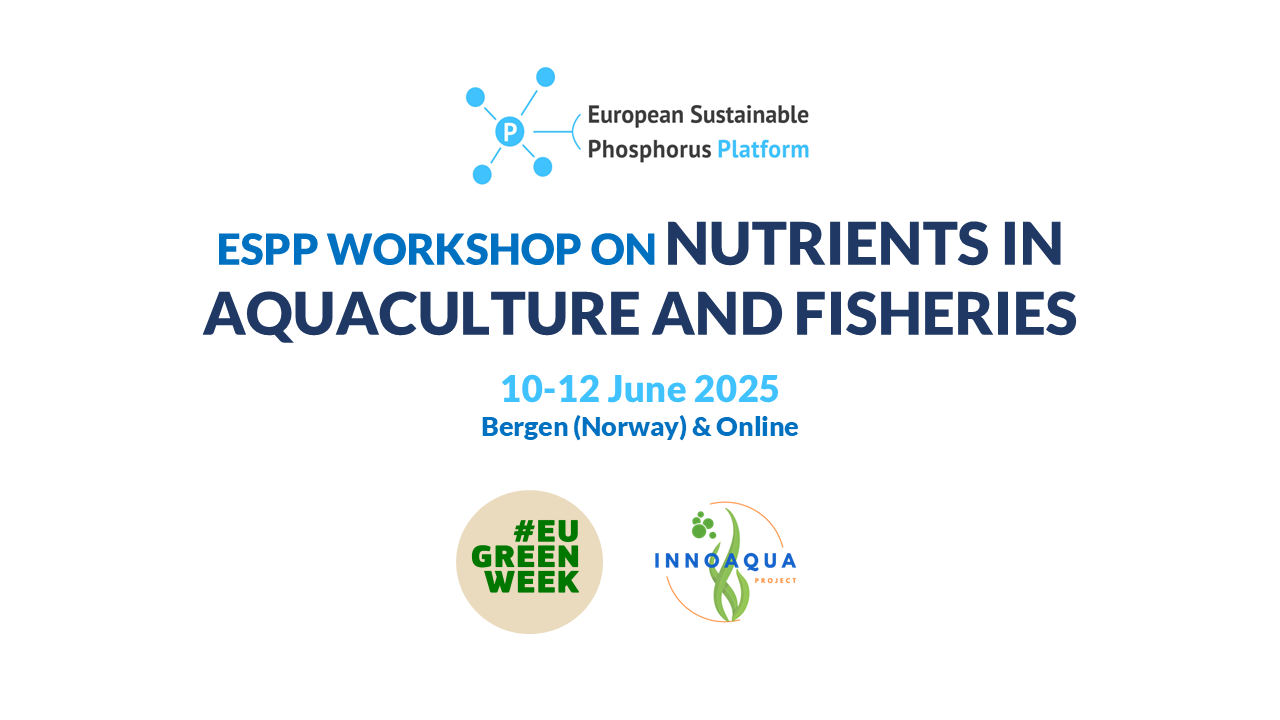
The new EU requirements of the revised Urban Waste Water Treatment Directive for phosphorus removal, reuse and recycling
13 March 2025, Amsterdam and online
ESPP is organising a one day workshop on "The new EU requirements of the revised Urban Waste Water Treatment Directive for phosphorus removal and recycling: interactions between tighter discharge consents, chemical P-removal coagulants, processes for P-recovery", on the 13th March 2025, within Aquatech, Amsterdam RAI + online (the world’s largest professional event on water, with 20 000 participants).
Registration and programme available here: https://phosphorusplatform.eu/AquatechWorkshop
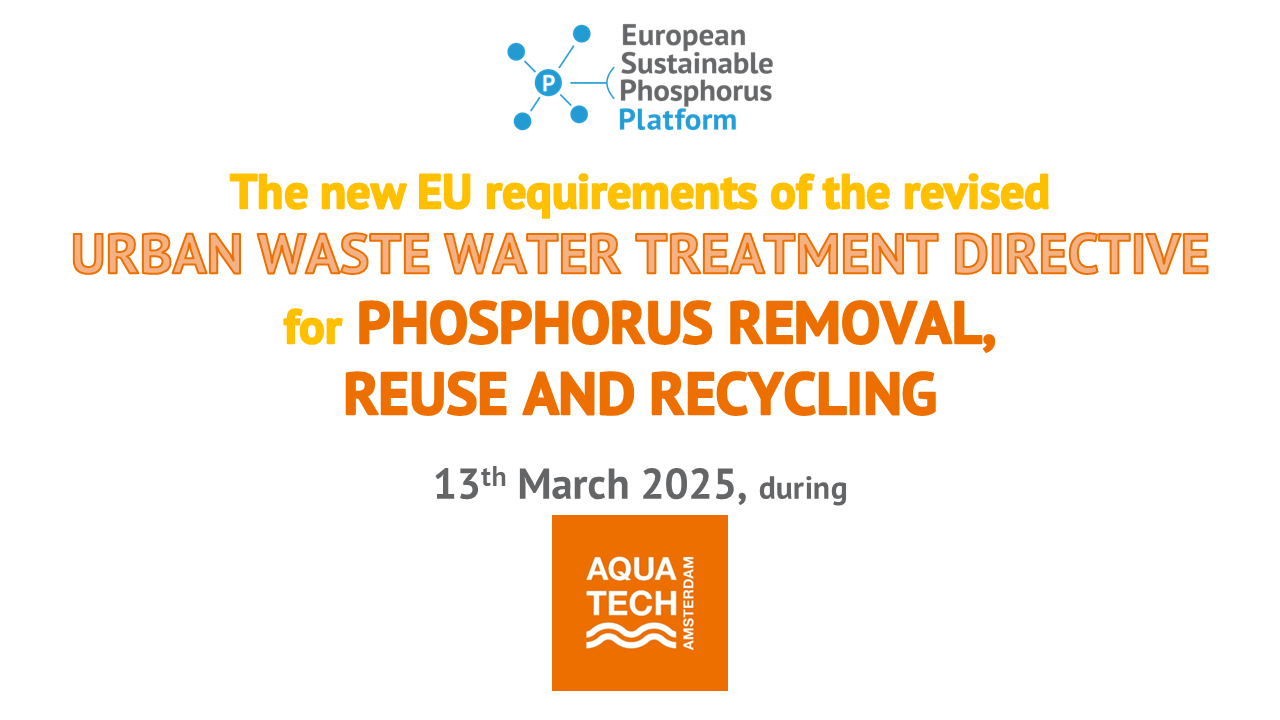
Nutrient proposals for the new EU Circular Economy Act and the CAP
21-22 January 2025, Brussels and online
The President of the European Commission, Ursula von der Leyen, plans an ambitious EU Circular Economy Act, to follow the second Circular Economy Action Plan (March 2020), replacing this Commission document by a regulatory act. Her mission letter for the new Commissioner for Environment, Water Resilience and a Competitive Circular Economy, Jessika Roswall, specifies that the new Circular Economy Act should include measures to create market demand for secondary materials and a single market for waste, especially for critical raw materials (phosphate rock is on the EU Critical Raw Material List since 2014, confirmed in the EU Critical Raw Materials Act 2024). ESPP will develop proposals for nutrients in this expected new Act
The Common Agricultural Policy represents over 40% of the EU budget. The current CAP runs from 2023 to 2027. An interim evaluation report is expected in 2025. ESPP will develop proposals for integrating nutrient management (including the Green Deal and UNEP Biodiversity Convention 50% nutrient loss reduction objective) and nutrient recycling into the future CAP revision.
Two day meeting to discuss these two important policies and to develop proposals to input to the European Commission.
More information: https://www.phosphorusplatform.eu/policy2025
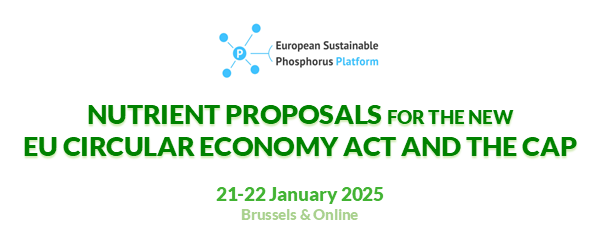
ESPP workshop on legal aspects of algae grown in wastewater/waste gas/manure-ABPs/food waste - 13 November 2024
13 November 2024, Brussels and online, 14h – 18h30, legal status of biomass produced in wastewater treatment or with waste gas, manure or food waste inputs, and valorisation in fertilisers, feeds and industry. Presentation and discussion of legal analysis prepared for ESPP by Barry Love, Environmental Law Chambers, with user industries, algae production and processing experts, EU and national regulators.
Discover the workshop programme.
Registration available on Eventbrite.
Onsite participation = 50€ + VAT (contribution to organisation costs). Online participation: free.
https://www.phosphorusplatform.eu/legalworkshop
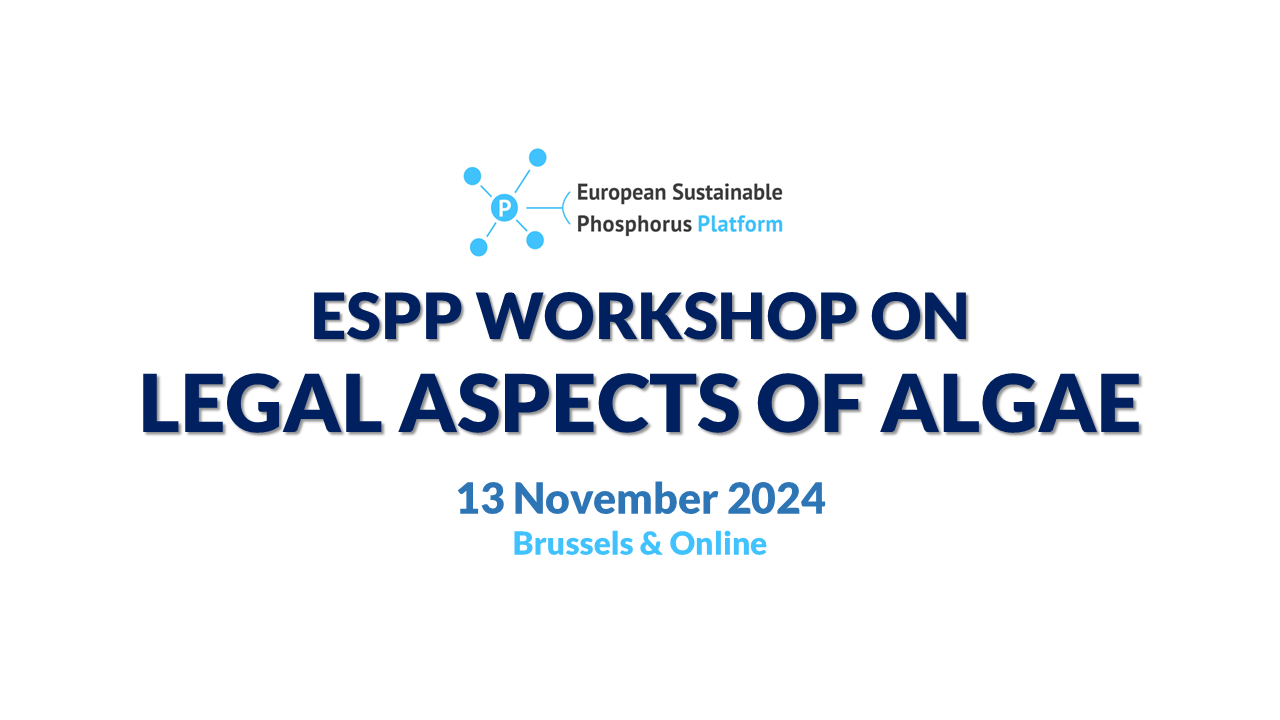
ESPC5 - Registration is open!
ESPP, together with BETA technological Center, is organising ESPC5 (5th European Sustainable Phosphorus Conference), taking place in Lleida, Spain, 8-10 October 2024.
The conference will delve into the challenges and opportunities of sustainable phosphorus management in the Mediterranean context, and will involve experts and stakeholders to discuss on themes such as organic agriculture, water reuse, eutrophication & P budgeting, and energy transition. The private sector experiences and the latest research on the topic will be complemented with site visits to biorefinery pilots in the region.
Registration is now open! Register here.
Learn more about the Conference: https://www.phosphorusplatform.eu/espc5
NERM (Nutrients in Europe Research Meeting)

16-17 April 2024 – Brussels & online –
plus research students meeting & site visits
NERM (Nutrients in Europe Research Meeting) is organised by ESPP, FERTIMANURE, LEX4BIO, RUSTICA, SEA2LAND, WALNUT and Biorefine Cluster Europe.
Towards closing nutrient cycles for a sustainable future, from R&D to implementation. NERM will include:
- key outcomes of recent nutrient recycling R&D under Horizon 2020, LIFE, Interreg and other programmes
- roadmap for future nutrient recycling R&D needs
- nutrient recovery technologies and recycled fertiliser production
- quality, application and use, stakeholder acceptance of secondary fertilisers
- from nutrient recovery to market
Plus PhD students and networking event 15th April and site visits 17th April (on-farm and sewage treatment nutrient recovery sites).
ESPP workshops on Nutrient recycling policy
13th March 2024 - Policy tools to support market pull for recycled nutrients
Identify policy tools to support market pull for recycled nutrients which could achieve consensus across industry and users.
The EU Green Deal 2019 mentions possible “legal requirements to boost the market for secondary raw materials, with mandatory recycled content” and the EU Circular Economy Action Plan 2020 refers to “stimulating the markets for recovered nutrients”. To date, there are no EU proposals.
Industry and user positions on possible market pull policy tools can differ. The aim of this meeting is to identify policies which could achieve consensus across recycled product producers (waste companies, recycling technology suppliers), industry and uses (fertilisers industries, distributers, farmers). And to discuss how to elaborate technical proposals to submit to policy makers. 13th March 2024 - Policy tools to support market pull for recycled nutrients.
Read more
14th March 2024 - Proposing UWWT Directive targets for P and N recovery
Define proposals for possible regulatory targets for phosphorus and nitrogen reuse-recycling from sewage.
The proposed UWWTD revision draft text (art. 20) states: “The Commission is empowered to adopt delegated acts … setting out the minimum reuse and recycling rates for phosphorus and nitrogen …”.
This meeting aims to develop consensus proposals for such “reuse and recycling rates”, covering for example:
- what are feasible “rates” for P and for N recovery?
- how should these “rates” be defined? … as % of wwtp inflow? … as % in sludge? … as % in ash? …
- as recovery of P or N down to a certain residual level (per p.e.)? … other …?
- should the “rates” be different for wwtps of different size? different configuration? Before or after sludge energy valorisation / combustion ?
- definition of “reuse and recycling”? … Should this include treated sludge use in agriculture (biosolids to land). If so, under what conditions, e.g. quality / contaminants? plant nutrient availability? spreading according to crop nutrient requirements? CE or National fertiliser certification ?
- should “reuse” and “recycling” be addressed differently depending on context: size of wastewater treatment works, regional context …
- should quality/functional requirements be specified for recovered nutrient products?
- other questions proposed by meeting participants.
13th March 2024: policy tools to support market pull for recycled nutrients
14th March: proposing UWWT Directive targets for P and N recovery, ESPP policy workshop
Both: Brussels & online. Registration is open www.phosphorusplatform.eu/
SOFIE3 Conference and meeting on "Bio-Based" Nutrients
The 3rd edition of the SOFIE conference on organic and organo-mineral fertilisers industry will take place on the 16-17 January 2024, Brussels (Plaza Hotel) & hybrid. 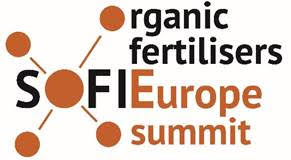
SOFIE is the only industry meeting place for organic-carbon-based fertiliser producers, distributors, advisory, technology suppliers.
SOFIE3 will cover:
🔹policy and market
🔹agronomic benefits, in particular field trials and case studies
🔹processing from divers input materials to consistent products for farmers
🔹application best practices, e.g. co-application with mineral fertilisers, biostimulants
🔹environment, carbon benefits, LCA, Circular Economy
🔹business models and product success stories
Speakers include European Commission (DG AGRI and DG GROW), Notified Bodies (CerTrust, EFCI Register), Yara, ICL, Fertilisers Europe, Eurofema, EBA, S&P/Fertecon, ADAS, Nutriënten Management Instituut, IPS Konzalting. Registered participants include K+S, Sede Environment, Culterra, Terramarine, Tessenderlo Group, Unimer, Den Ouden, Fertinagro, Ductor, DCM, Compo, Stiesdal, Biota Nutri, Darling Ingredients Omya, Honkajoki, Labin, Ormin, Sappi, Agrana Starch, Green Circle, Centeon, AgriBioSource Europe, Alan SRL, The Waste Transformers, Steel Belt Systems, Sedron Technologies, Sanitation360.
Don't miss our updates on the SOFIE3 conference.
SOFIE3 is co-organised by ESPP, Eurofema and Fertilizers Europe, with support of the International Fertiliser Society and SILC Fertilizzanti.
SOFIE3 will be followed by ESPP's meeting on Defining “Bio-Based Fertilisers” and FPR “solely biological origin” (18th January 2024 - Brussels and online). More information available here.
Which recycled nutrients for Organic Farming? ...and why?
Monday 18th September 2023, 14h-17h, online, co-organised by IFOAM Europe and ESPP.
Participants: representatives of Organic Farming organisations from across Europe.
Recycled struvite and precipitated phosphates have been added into the list of authorised inputs as fertilisers in certified EU Organic Farming (ESPP eNews n°73). Certain other recycled nutrients are already authorised with conditions.
This meeting will discuss which further recycled nutrient products might be appropriate for certified Organic Farming, based on practical examples, and under what conditions they might be considered. Questions considered: solubility and plant availability of nutrients, origin of raw materials, chemicals used in recovery process and LCA, contaminants and safety. Examples will be: calcined phosphates, biochars, phosphate fertilisers from ashes, recovered ammonia sulphate, recovered nutrients from aquaculture and other marine wastes.
Full meeting agenda HERE. Registration on Eventbrite.
EU public consultation on Critical Raw Materials extended to
30th June
Consultation extended to 30th June 2023 on draft EU Critical Raw Materials Regulation, before discussion in EU Parliament and Council, covering Critical and Strategic Raw Materials Lists, with update of the EU Critical Raw Materials List. Elemental phosphorus (P4) and phosphate rock are NOT included in the proposed list of “Strategic” Raw Materials.
ESPP has input to provide reasons why Elemental Phosphorus (P4 and derivates) and Purified Phosphoric Acid (PPA) should both be included in the “Strategic Raw Materials” List, and suggests that materials critical for EU food security should be assessed and defined Strategic.
ESPP’s input to the public consultation is on the EU website here and the full document submitted is at www.phosphorusplatform.eu/regulatory (under “EU Critical Raw Materials”).
Individuals, companies and organisations can input to the EU public consultation until 30th June here.
WARM (White Ammonia and N-recovery Research Meeting)
ESPP is organising a first White Ammonia and N-recovery Research Meeting (WARM) in Brussels and hybrid, 7th June 2023. This will showcase research and innovation into nitrogen recovery and make links from EU R&D policy to industry implementation. 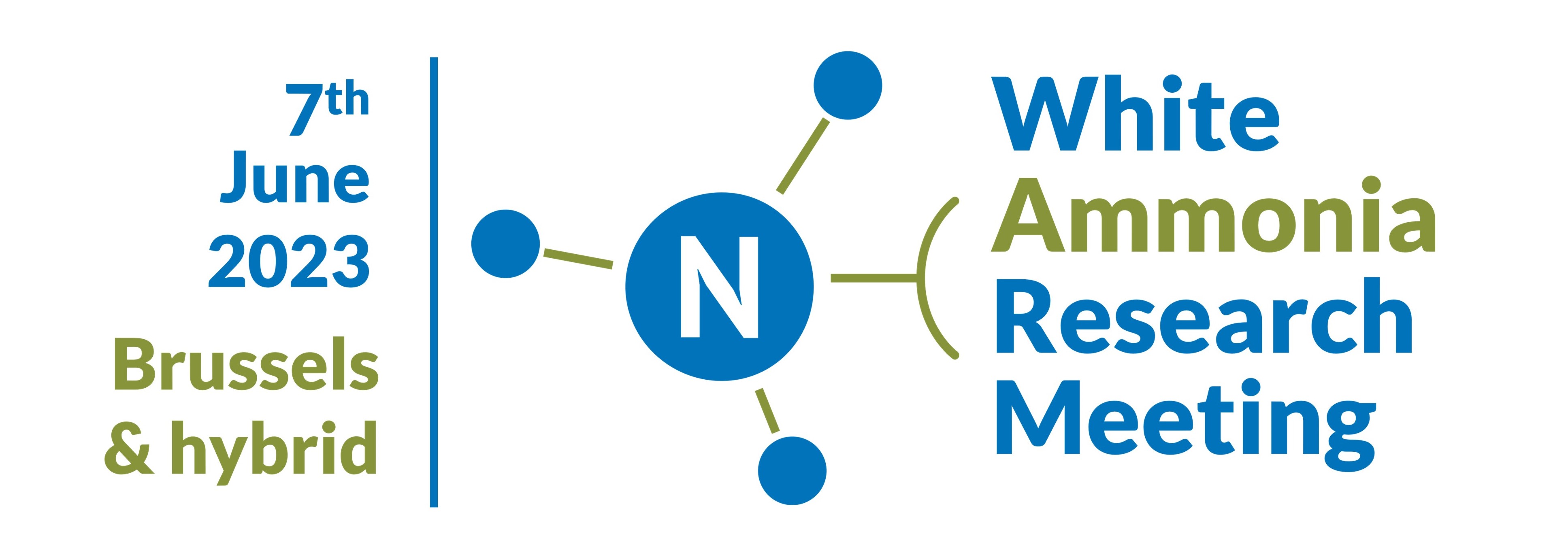
This is within EU Green Week, Brussels, and back-to-back to the 6th Power to Ammonia conference by NH3 Event, Europe’s biggest ammonia event, Rotterdam 8-9th June 2023 (one hour train from Brussels).
The final programme of the research meeting is available here.
Speakers already include DG RTD, DG ENV (Life), Severn Trent, ACEA, Fertilizers Europe, BETA Technology Centre Spain, EasyMining – RagnSells, Detricon, VTT, Boku, UGent, Fraunhofer Umsicht, INMS (International Nitrogen Management System), Cranfield University, Cetaqua, Colubris, INSA Toulouse, VunaNexus Switzerland, Università Politecnica delle Marche, Inagro, Politecnico Milano, GNS Halle, Samforsk Norway, Algen, FiBL …
Registration is open here.
What does the term “Bio-Based Fertiliser” mean?
EU Communication on “Bio-Based" and relevance to nutrients
The European Commission has published a communication on the use of the term “Bio-Based Plastic” which can be seen as relevant for the term “Bio-Based Fertiliser”. The Communication refers to the CEN/TC4111 definition of Bio-Based and indicates that Bio-Based plastics are made from biomass, with a preference for organic wastes and by-products, whereas conventional plastics are made from fossil resources.
ESPP notes that the term Bio-Based Fertiliser is already being used in R&D and that a comparable discussion is ongoing concerning the wording “nutrients of solely biological origin” in the EU Fertilising Products Regulation. ESPP considers that the definition and usage of these vocabulary terms are important for market clarity and for a possible future European Standard on defining and measuring “Bio-Based nutrient” content to support environmental claims and EU Fertilising Products Regulation certification.
ESPP is therefore developing a Position Paper on the definitions of “Bio-Based Fertiliser” or “Bio-Based Nutrient”, available here, that is open to comment. The objective is to achieve consensus on a proposed definition to submit for consideration by the European Commission and by CEN.
SOFIE3 - 3rd Summit of the Organic and organo-mineral Fertilisers Industries in Europe
 Brussels & online, 16-17 January 2024
Brussels & online, 16-17 January 2024
We are pleased to announce that the 3rd Summit of the Organic and organo-mineral Fertilisers Industries in Europe (SOFIE3) will take place in Brussels and online on the 16th-17th January 2024.
A full summary of the SOFIE2 Conference will be published as an ESPP SCOPE Newsletter in coming weeks. If you are not already subscribed to ESPP eNews and SCOPE, subscribe here.
Slides, posters and participants list are available to all registrants on the Swapcard app.
ESPC4 and PERM 20-22 June 2022 hybrid online and Vienna, Austria

Nearly 300 participants are now confirmed for Vienna and online, 20-22 June, for ESPC4 (4th European Sustainable Phosphorus Conference), PERM (Phosphorus Research in Europe Meeting) site visit and young researchers networking event.
If you can’t make it to Vienna, register to participate online, now.
All plenary sessions and 4 (of 12) parallel sessions will be online (see programme).
We will be using SWAPCARD to enable contacts and networking between all online and in-person participants (accessible after registration only), one chat & forum for the whole event enabling questions, discussion and exchange of information, as well as your own profile, programme, access to session recordings after the event …
Confirmed speakers include the European Commission (DG Environment, DG GROW, DG Research, CINEA), international organisations, leading companies, scientists and stakeholders.
Registration: https://phosphorusplatform.eu/espc4
ESPP job offer
 Are you looking for a new challenge in sustainability, with networking across industry, science and regulation? ESPP is looking to engage a Brussels representative, full or part time. Your role will be to develop networking, industry participation and Platform membership, including widening scope beyond phosphorus to recovery of nitrogen and other nutrients. We are looking for someone who can analyse and communicate technical, scientific and regulatory information on phosphorus, nutrients and recycling, who is motivated for environmental objectives and combines a business-development and an association consensus culture. Minimum 5 years’ experience, existing network Employment could be as salaried staff, consultant status or shared staff with another organisation having similar objectives.
Are you looking for a new challenge in sustainability, with networking across industry, science and regulation? ESPP is looking to engage a Brussels representative, full or part time. Your role will be to develop networking, industry participation and Platform membership, including widening scope beyond phosphorus to recovery of nitrogen and other nutrients. We are looking for someone who can analyse and communicate technical, scientific and regulatory information on phosphorus, nutrients and recycling, who is motivated for environmental objectives and combines a business-development and an association consensus culture. Minimum 5 years’ experience, existing network Employment could be as salaried staff, consultant status or shared staff with another organisation having similar objectives.
Full job description on www.phosphorusplatform.eu/joboffer2022 Send CV to before 8th March 2022.
Please pass on this information.
Perspectives for reducing “legacy phosphorus” in agricultural soils
2 February 2022, 14h – 17h CET
The webinar will discuss:
i) relationships between draw-down of soil P and crop productivity
ii) relationships between draw-down of soil P and diffuse P losses from agricultural soils
This ESPP webinar will follow on from the SPA (US) webinar “A Legacy of Phosphorus”, 30th September 2021, 18h-19h30 CEST and from the Frontiers in Earth Science special on ‘Legacy Phosphorus’ summarised in ESPP eNews n°56
A SCOPE Newsletter Special Issue will summarise this ESPP webinar and will also include selected further abstracts submitted as well as a c. 20 relevant recent scientific publications.
Online. Free. Register here
P-recovery in EU list of top-100 green activities … but clarifications needed
The EU Taxonomy will classify which economic activities, and when, are considered environmentally sustainable, so eligible for EU Green Deal investment. It may become a key tool for private investors, markets, other public policies. Phosphorus recovery from sewage is one of the 100 activities listed (at the same level as e.g. livestock production, crop production, hotels and accommodation …) but N-recovery or P-recovery from other streams is not cited.
Consultation open to 24th September 2021, 18h00 deadline (not midnight).
UNESCO report on Harmful Algal Blooms (HABs)
A first-ever UN report shows that nearly 10 000 ocean Harmful Algal Blooms were recorded worldwide over 33 years, and that impacts are increasing with rising seafood demand and coastal development.
109 scientists from 35 countries analysed over 9 500 HAB events including 7 million microalgae data points, of which nearly 290 000 toxic algae species occurrences, using the Harmful Algal Event Database (HAEDAT). The widely suggested idea that blooms are increasing with climate change is not confirmed, with blooms increasing in some areas of the world and decreasing or steady in others. Increases in reported HAB events are correlated to increased monitoring and increases in perception are probably related to increased aquacultural production and coastal development. Both Europe and the Mediterranean regions show an increase trend in reported HAB events over the study period (from 1985 to 2018), but possibly with an apparent peak around the year 2000 and after that a decrease in HAB events in the Mediterranean region and fluctuations without a clear increase in Europe (see Hallegraeff et al. Fig. 3 p. 5).
4th Phosphorus in Europe Research Meeting (PERM)
2 June 2021, 09h00 -15h30 (Paris time, CET), online
Register here
EU Green Week Partner Event - #EUGreenWeek
This meeting, co-organised by ESPP, Biorefine Cluster Europe and ETA-Florence Renewable Energies, will link science, industry, agriculture and policy makers. EU-funded projects on nutrient sustainability and phosphorus recycling (Horizon2020, Interreg, LIFE…) and national and company nutrient projects will present, enabling dialogue and synergies. PERM will address how to improve uptake of project recommendations by policy makers and users, through to market, and identify perspectives for research and policy, and implementation gaps.
Proposals are welcome for presentations of studies into what factors in nutrient R&D projects improve uptake of conclusions by policy makers, industry and users.
Download the Programme
HERE as PDF
If you wish your project to be included in the programme and/or added to the inventory of projects, please contact
ESPC4 Full programme now online
This is the major event on phosphorus sustainability in Europe, taking place every 2-3 years. The full programme of speakers for the 4th European Sustainable Phosphorus Conference, Vienna, 20 - 22 June 2022, is now published (Registration is now open on Eventbrite). Sessions cover city and regional actions on nutrient stewardship, business case examples of phosphorus recycling, policy tools, research perspectives and new technologies for P-recovery from research to industrial implementation in Europe and worldwide.
ESPC4 is jointly organised by the European Sustainable Phosphorus Platform (ESPP) and Proman Consulting, with support of the City of Vienna (Municipal Department 48 (MA48); Waste Management, Street Cleaning and Vehicle Fleet) and of Borealis, EasyMining, WKU and LAT
Registration: Eventbrite
Conference programme, hotel lists, etc: http://www.phosphorusplatform.eu/espc4
4th European Phosphorus Research Meeting (PERM)
The third day of ESPC4 (22 June 2022, Vienna) will be the 4th European Phosphorus Research Meeting, showcasing R&D into phosphorus recycling and recycled products and new approaches to phosphorus stewardship. This is a unique opportunity to meet and exchange with other projects working on phosphorus, and to discuss research perspectives with the European Commission, industry and stakeholders. The meeting will be limited to around 100 participants, 20 project flash presentations and around 20 posters, in order to enable dialogue, discussion and networking. To participate: register as below and contact
Co-organised by ESPP, Biorefine Cluster Europe, TU Wien, Proman Consulting.
Registration with booking for ESPC4: Eventbrite
Conference programme, hotel lists, etc: http://www.phosphorusplatform.eu/espc4
Workshop on iron phosphate chemistry applied to phosphorus stewardship
ESPP, with WETSUS, INCOPA, INRAE Rennes and the Horizon 2020 projects P-TRAP and SUSFERT, is organising a science and implementation workshop on iron phosphate chemistry in different systems (sediments, soil, agriculture, waste water and sewage sludge). The objective is to improve understanding of applied iron phosphate chemistry in these systems, to develop phosphorus recycling, eutrophication management and better agronomic use of secondary resources. The 1.5 day workshop will be held in Utrecht, the Netherlands 13 - 14 July, 2020 and include a networking dinner. The themes will cover: Iron phosphorus interactions in sediments, in soils and engineered systems, Strategies for phosphorus release and P-recovery from iron phosphates, Iron - phosphate interactions in agriculture and Markets for recovered iron phosphate materials.
Utrecht, the Netherlands 13-14 July, 2020. See note below on Corona virus. Registration: here
Contact:
Corona virus situation
ESPP is monitoring with concern the Corona virus development. In agreement with the City of Vienna for ESPC4 and PERM have been postponed to 20 - 22 June 2022. All registrations will be transferred to the new date. If attendance is not possible for the registrant, then partial reimbursement will be made (minus non-recoverable costs). All registrants will be directly updated of developments by email.
COVID and sewage
Researchers at KWR Netherlands have found gene fragments of the Covid-19 virus in wastewater entering a sewage works, with repeated tests confirming the results. The virus gene fragments were not detected in the sewage works effluent (treated water), but only one site was tested, and sewage sludge was not tested. Although the tests do not discriminate between potentially active virus and inactive fragments, it is underlined that the results do not indicate that Covid-19 infection is possible from sewage. Workers in contact with wastewater should in any case use protective equipment, because of other health and safety risks in handling wastewater, and the water industry underlines that this should be reinforced. The World Health Organisation briefing on Covid-19 in water and sewage (19th March) can be summarised as follows: there is no proof for this the Covid-19 virus, but it has a fragile outer membrane and is likely to be more rapidly inactivated in sewage than other viruses which have been shown to survive for days to weeks in water or sewage (e.g. gastroenteritis, hepatitis). A new paper in Nature (published 1/4/20) found high virus RNA concentrations in faeces of nine Covid-19 patients, but no infectious virus in faeces, in urine nor in blood. The study concludes that there were indications of viral replication in the gut and that the absence of detected viable virus in faeces may be because the nine patients were mild cases, and none had diarrhoea (which occurs in maybe 2% of Covid-19 cases).
KWR press release “What we learn about the Corona virus through waste water research“ 24th March 2020
KWR Webinar “COVID-19: Significance and impact of the pandemic for the water sector”
WHO “Water, sanitation, hygiene, and waste management for the COVID-19 virus. Interim guidance” 19th March 2020
“Virological assessment of hospitalized patients with COVID-2019”, R. Wölfel et al., Nature, 1 April 2020
Corona Virus situation
Postponement of ESPC4 and PERM (4th European Sustainable Phosphorus Conference and European Phosphorus Research Meeting), Vienna 15-17 June 2020.
Given the development of the international corona virus situation, and after re-discussion with the venue hotel and the Belvedere Palace, we have decided to postpone ESPC4 and PERM to Vienna 31st May – 2nd June 2021.
All registrations will be transferred to the new date to be fixed. If this is not possible for the registrant, then partial reimbursement will be made (minus non-recoverable costs). All registrants will be directly updated of developments by email.
Friday 27th November: Nutrients in the EU Farm-to-Fork and Horizon Europe
Registration: https://www.eventbrite.co.uk/e/nutrients-in-eu-farm-to-fork-policy-tickets-127743595533
Within the new Green Deal, the EU's 'Farm-to-Fork’ policy poses ambitious objectives for agriculture – food system sustainability, including to reduce nutrient losses by 50% and fertiliser use by 20% before 2030, to improve nutrient stewardship (revised Circular Economy Action Plan and European Integrated Nutrient Management Action Plan) and to address diet, including via consumer food product nutrition labelling. Horizon Europe also underlines circularity in the food system, and proposes to develop a “comprehensive EU policy to balance nutrient cycles”.
The objective of this webinar is to understand challenges and opportunities for nutrient management in 'Farm-to-Fork' policy implementation and enable dialogue between policy makers, NGOs, industry and professional organisations, scientists and regions/cities.
Friday 27th November, in three parts:
- 9h00 - 10h30 CET: dialogue and questions/discussion with experts
Nutrients in EU Green Deal policies: from objectives to actions
- 11h30 -12h30 CET: preparation of a contribution document for the European Commission
Input to the EU's Integrated Nutrient Management Action Plan
- 14h-15h30 CET: ESPP Annual General Assembly - members only
After registering, you are invited to prepare before 23 November 2020 a contribution which will be circulated to all webinar registrants. ESPP will put circulate to all registrants one indexed pdf document containing all contributions received by this date: maximum one page but a well-spaced half page is more likely to be read, must be in WORD or RTF, can include hyperlinks to other documents, websites, etc, should include your contact email(s). Submissions which are too long or not in WORD/RTF will NOT be used. You can also prepare a very short statement which you can input to the online ‘Chat’ during the meeting to link to this submission document and/or your website or to a publication, as well as preparing ‘Chat’ questions to the webinar speakers and panellists
Friday 27th November. 2020.
Registration: https://www.eventbrite.co.uk/e/nutrients-in-eu-farm-to-fork-policy-tickets-127743595533
Full programme and speaker updates here: https://www.phosphorusplatform.eu/events
Calls for texts and papers - Climate Change, PERM
Call for texts: phosphorus stewardship and climate change
ESPP (European Sustainable Phosphorus Platform) and the Sustainable Phosphorus Alliance (North America) are preparing a special SCOPE Newsletter edition on “Nutrients and Climate Change”. This will consist of selected short texts presenting expert perspectives on how climate change will impact nutrient emissions and eutrophication as well as actions to mitigate this. Proposed texts are invited from researchers, companies, stakeholders and any interested party. Around twenty texts will be selected for publication.The SCOPE Newsletter is circulated worldwide to 41 000 companies, stakeholders, regulators and media interested in nutrient management, with a detected opening rate of 12-14%, and is published on the ESPP website www.phosphorusplatform.eu Send us your ideas for action for on nutrients and climate change to appear with the world’s leading experts. Maximum 600 words. Deadline 29th February 2020 latest. Call details and instructions here: https://phosphorusplatform.eu/callfortexts
4th Phosphorus in Europe Research Meeting (PERM), Vienna, 17th June 2020
A unique opportunity to meet and exchange with other projects working on phosphorus, and to discuss research perspectives (in Horizon Europe and in national / regional programmes) with the European Commission, industry and stakeholders. Programme is now online www.phosphorusplatform.eu/espc4
Part of the 4th European Sustainable Phosphorus Conference (ESPC4), Vienna 15-16 June www.phosphorusplatform.eu/espc4 Confirmed speakers at ESPC4 already include: Ulli Sima (Vienna City Minister of Environment), Franz Josef Radermacher (FAWn, Club of Rome), Claudia Olazabal (DG Environment, Head of Unit Soil Health), Silvia Tonti (Yara), Isidro Campos Rodriguez (DG AGRI, CAP), Theodora Nikolakopoulou or Johanna Bernsel (DG Grow, Fertilising Products Regulation), Annika Eskusson or Katja Klasinc (DG Research, P-Recycling R&D Programs), Jacob B. Hansen (Fertilisers Europe), Mark Sutton or Will Brownlie (GPNM, Centre for Ecology and Hydrology), Mahesh Pradhan (UN Environment) and representatives of eight cities presenting their Nutrient Management and Circular Economy Strategy.
European workshop: Waste water phosphorus removal tomorrow: ambitions and reality
Wednesday 9th October, Liège University
Back-to-back to ECSM’19 (European Conference on Sludge Management), Liège 6-8 October 2019
More information: www.phosphorusplatform.eu/Premovalworkshop
Conference Symbiosis and Circular Economy in fertilizers Are by-products a thing of the past? Unlocking the new fertilizer Regulation - 7th March 2018 - Brussels
Flyer - Email - Registration
The morning session will highlight viewpoints from professionals working in industrial production and will present practical examples of symbiosis within different fertiliser industry sectors. The afternoon will feature EU decision makers in this area, and will include a panel debate which will aim to find a solution within the political spectrum on the use of byproducts and industrial symbiosis. Organized by Fertilizers Europe. More information
Read previous SPOTLIGHT features.
Nutrients, circular economy and in the food & beverage industry
ESPP will present and chair during the 6th Sustainable Development in the Food & Beverage Industry Conference, 16-17 January, Berlin (ENG European Networking Group). The conference focusses on the sustainable value chain for food production and consumption. ESPP will address phosphorus, from the field to diet, integrating nutrient stewardship and recycling into food production sustainability criteria. Conference speakers include CEOs and sustainability directors from leading food companies, supermarkets and restaurants, as well as the FAO and the European Commission.
Read previous SPOTLIGHT features.
ESPP - IFOAM European organic farming stakeholder meeting
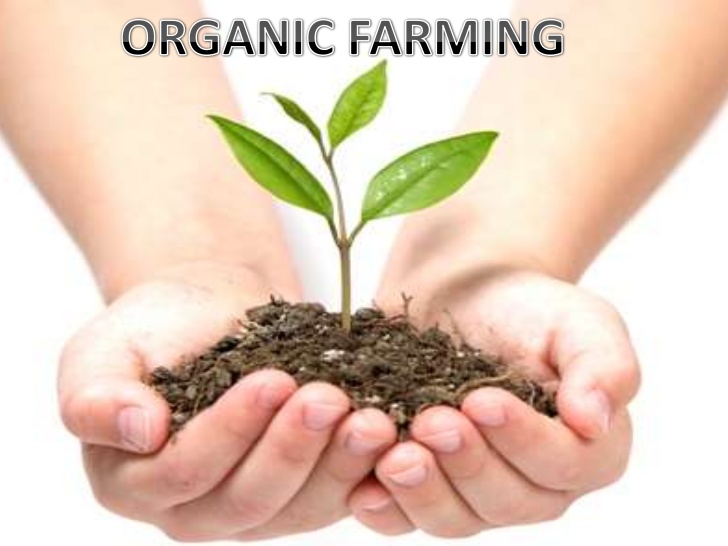
Stakeholder meeting on
Acceptance and value of recycled
fertilisers in organic farming
12th December – Brussels.
Registration:
www.eventbrite.ca/e/recycled-nutrients-and-organic-food-tickets-38702699817?aff=es2
Read previous SPOTLIGHT features.
Everglades Foundation George Barley Water Prize - Stage 2 US$ 80 000 prize
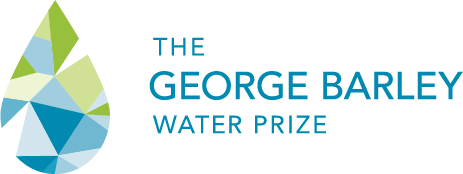 Now open for submissions – deadline to request materials = 15th July 2017
Now open for submissions – deadline to request materials = 15th July 2017
Stage 2 of the Everglades Foundation George Barley Water Prize is currently open for applications for teams capable of testing their solution for two consecutive weeks processing c. 24 litres/hour (see exact specifications in application materials). Applicants will submit daily inflow and outflow samples from their technology. A total of $80,000 will be awarded in November of this year to the top 3 teams in Stage 2. You can apply to stage 2 whether or not you applied to stage 1. The deadline to request Stage 2 application materials is 15th July 2017 and the deadline to submit applications is 31 August 2017. Beyond Stage 2, the Pilot Stage, the third stage of the George Barley Water Prize, will qualify 10 teams to compete at a Pilot location in Canada in early 2018, with awards totalling $800,000. Finally, the Grand Prize will see the top 4 teams compete in Florida for the ultimate $10 million award. Information www.barleyprize.com
WETSUS (NL) is George Barley Water Prize stage 1 winner
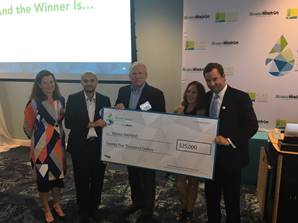
The George Barley Water Prize (Everglades Foundation) has named its first winner as WETSUS Netherlands, with the NaFRAd project (Natural Flocculation Reversible Adsorption). WETSUS (European Centre of Excellence for Sustainable Water Technology) takes home the US$ 25 000 prize for the Prize Stage 1. After winning Stage 1, the Wetsus team is now preparing its submission for the second stage which requires testing and demonstrating at the laboratory lab scale. Stage 2 of the Prize is open to organisations worldwide, whether or not they participated in Stage 1. Deadline: 15th July 2017. See more information here.
Outcomes online ESPP conference Phosphorus stewardship in industrial applications
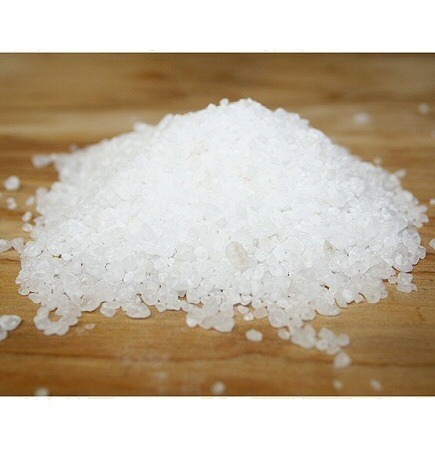
The presentations of the ESPP conference on Phosphorus stewardship in industrial applications (01-12-2016) are now online here. The report of the conference is published as a SCOPE newsletter article "Phosphorus in the chemicals industry".
1st December ESPP General Assembly “Phosphorus stewardship in industrial applications”
 European Sustainable Phosphorus Platform (ESPP) General Assembly focussing on Phosphorus stewardship in industrial applications will be held on Thursday 1st December, Brussels, within the First EU Raw Materials Week. Success stories and innovation in P stewardship in industry will be presented and areas for possible research or value-chain collaboration will be identified. Programme and registration here.
European Sustainable Phosphorus Platform (ESPP) General Assembly focussing on Phosphorus stewardship in industrial applications will be held on Thursday 1st December, Brussels, within the First EU Raw Materials Week. Success stories and innovation in P stewardship in industry will be presented and areas for possible research or value-chain collaboration will be identified. Programme and registration here.
27 October ESPP workshop Pharmaceuticals in sewage biosolids

ESPP is organising a workshop on “Pharmaceuticals and organic chemicals in sewage biosolids: questions for recycling”, Malmö (near Copenhagen) 27th October 8h00 – 12h00, in cooperation with the Nordic Phosphorus Conference, 27th October (12h00) – 28th 13h30 (same venue). See Facebook event page. More info here.
27 October ESPP workshop Pharmaceuticals in sewage biosolids

ESPP is organising a workshop on “Pharmaceuticals and organic chemicals in sewage biosolids: questions for recycling”, Malmö (near Copenhagen) 27th October 8h00 – 12h00, in cooperation with the Nordic Phosphorus Conference, 27th October (12h00) – 28th 13h30 (same venue). See Facebook event page. More info here.
Summary ESPP meeting on EU Fertiliser Regulation revision
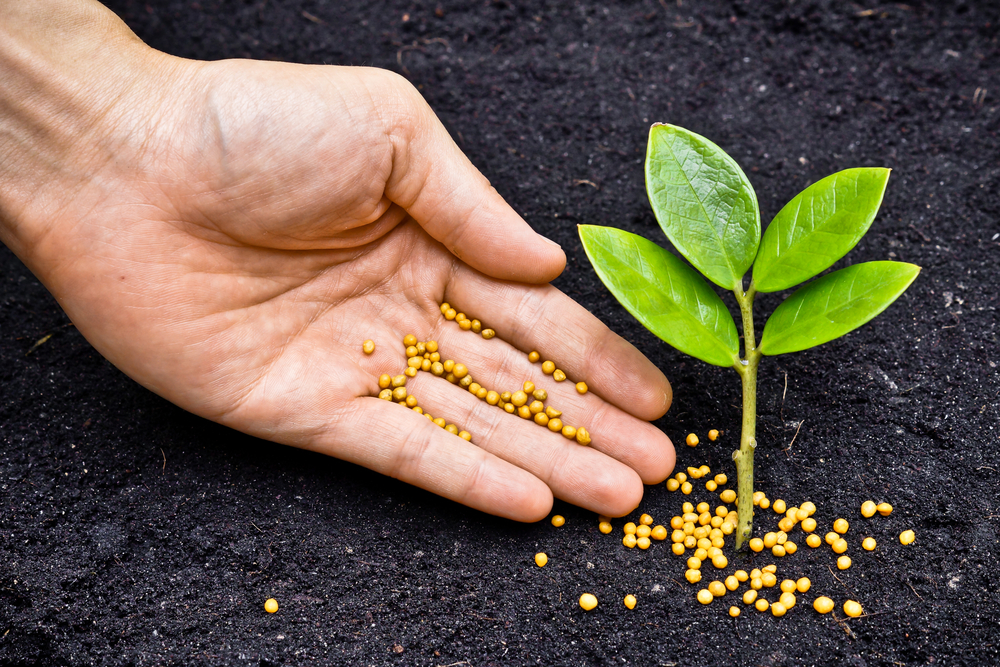
Summary of the ESPP working meeting on the EU Fertiliser Regulation revision, held Brussels 29 June 2016, can be downloaded here. Presentation by the European Commission and other stakeholders are included as annexes. Background information of the workshop can be found here. See also other inputs of ESPP to the Fertiliser regulation revision process in the Regulatory Activity section.
Join our nutrient recycling R&D list and event:
www.phosphorusplatform.eu/scope-in-print/news/1500-nutrient-recycling-r-d-list-and-events
ESPP is developing an online listing of R&D projects addressing nutrient recycling, in order to facilitate exchange and knowledge transfer between projects and with potential user companies for recycling technologies and recycled nutrient products. In order to bring together nutrient recycling R&D and user industries.
In order to bring together nutrient recycling R&D and user industries: European nutrient recycling event, Basel, 18th and 19th October: programme and registration (now open) www.nweurope.eu/phos4you
Read previous SPOTLIGHT features.
ESPP presentations now online on SlideShare
ESPP presentation UNIFA circular economy workshop from European Sustainable Phosphorus Platform
ESPP meeting on EU Fertiliser Regulation revision
ESPP will organise a technical meeting on recycled nutrient products in the proposed EU Fertiliser Regulation revision,
29th June 9:00-17:00, Brussels. If you wish to participate in this meeting please indicate to me your name and organisation
More information here.
Kick-off workshop ARREAU Struvite Recovery & Recycling Learning Alliance
Meet at 16 June 2016, Amersfoort, Netherlands, European struvite recovery operators willing to share their practical experience and learn more about running recovery technologies. This workshop will be linked to the official commissioning of the first WASSTRIP/PEARL/LYSOTHERM facility in the world.
More information at: http://www.eip-water.eu/arreau-struvite-recovery-recycling-learning-alliance
Outcomes Forum for Action - Recycle nutrients, clear the waters

Presentations, live stream and outcomes of the ESPP co-organized event "Forum for Action - Recycle nutrients, clear the waters" at 20 April in Helsinki, Finland can be found here: http://mmm.fi/en/recyclenutrients
Forum for Action - Recycle nutrients, clear the waters

20 April, Hotel Scandic Park, Mannerheimintie 46, Helsinki, Finland.
Registration now open and program online.
You can present your experiments and experiences in nutrient cycling on the Forum of Solutions.
http://mmm.fi/en/recyclenutrients
DONUTTS - Data on Nutrients to Support Stewardship
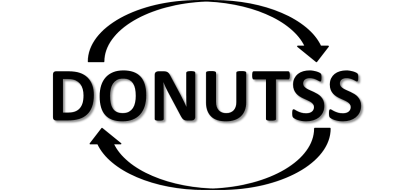 Adequate, up-to-date data, in a useable form, is essential to support nutrient stewardship decisions and investments, both for policy makers and for industry. Through the DONUTSS project, ESPP hopes to define how to ensure collection and management of nutrient data necessary to develop the bio-nutrient circular economy. A first workshop, Ghent (3-4 Sept 2015) brought together the European Commission services, data organisations, industry federations and scientists to discuss how to take this forward.
Adequate, up-to-date data, in a useable form, is essential to support nutrient stewardship decisions and investments, both for policy makers and for industry. Through the DONUTSS project, ESPP hopes to define how to ensure collection and management of nutrient data necessary to develop the bio-nutrient circular economy. A first workshop, Ghent (3-4 Sept 2015) brought together the European Commission services, data organisations, industry federations and scientists to discuss how to take this forward.
Join or support the DONUTSS consortium to ensure up-to-date nutrient data, in a useable form.
Follow this link to the DONUTSS workshop report and documents.
Circular approaches to P: EU Commission P-recycling report
The European Commission has published a report “Circular approaches to phosphorus, research to implementation”, presenting conclusions of the 4th March 2015 Berlin workshop on P-recycling.
The workshop was organised by the European Commission, P-REX and ESPP parallel to the ESPC2 (2nd European Sustainable Phosphorus Conference) and brought together 80 participants and 28 nutrient recycling projects (see list below). Initiatives present included R&D and demonstration projects funded by the EU (FP7, LIFE+, InterReg) as well as national funded projects and industry initiatives.
The workshop noted that some processes are already at the commercial production scale, e.g. processing manure to organic fertiliser, calcium silicate filter media for diffuse farm P-removal, struvite recovery, EcoPhos P-recovery from manure and sludge ash.
Participants underlined the need for policy support for phosphorus recycling and coherent interpretation of pertinent EU and national legislation as preconditions for widespread implementation.
The workshop identified the following R&D needs:
• Phosphorus flow studies (mass flows, characteristics), to identify points for P-recovery implementation
• Social science (attitudes, acceptance, choices) to accompany P-recycling implementation
• Actions covering the whole value-chain, from P-recovery to market of recycled P products
• Detection & risk assessment of organic contaminants in sewage sludge and recovered nutrient products
• Full-scale demonstration projects
• R&D to support standards, BAT, product criteria, best practices
• Coherency and interpretation of EU and national legislation
• Regional approaches and adapting to specific local situations or niche markets
• Clustering of projects and networking to enhance impact on policy, improve synergy and mutual learning and facilitate market uptake
“Circular approaches to phosphorus: from research to deployment”, 48 pages, European Commission Directorate-General for Research and Innovation 2015, ISBN 978-92-79-46827-8 http://bookshop.europa.eu/en/circular-approaches-to-phosphorus-pbKI0115204/ See also SCOPE Newsletter n° 113.
Kemira waste water treatment plant
EU consultation on Circular Economy
 The European Commission has opened (deadline 20th August 2015) a public consultation on the Circular Economy based on a proposed ‘Roadmap’ intending to make more ambitious the previous 2014 ‘Circular Economy Package’. This indicates that an Action Plan will identify key measures across the value chain, citing as possible specific areas of intervention waste management, development of markets for secondary raw materials (e.g. organic fertilisers) and critical raw materials (including phosphorus).
The European Commission has opened (deadline 20th August 2015) a public consultation on the Circular Economy based on a proposed ‘Roadmap’ intending to make more ambitious the previous 2014 ‘Circular Economy Package’. This indicates that an Action Plan will identify key measures across the value chain, citing as possible specific areas of intervention waste management, development of markets for secondary raw materials (e.g. organic fertilisers) and critical raw materials (including phosphorus).
Make your input to this consultation (individuals, organisation) by deadline 20/8/2015
SYMPHOS: The International Symposium on Innovation and Technology in the Phosphate Industry
18-20 May 2015, Marrakesh, Morocco
The International Symposium on Innovation and Technology in the Phosphate Industry, organised by the OCP Group, focuses on innovation, technology and current trends in processes to upgrade phosphates and derivatives and R&D prospects in the phosphate sector. The 3rd SYMPHOS will take place in Marrakesh, Morocco, 18-20 May 2015. Watch the video here below or on YouTube.
eMarket launched!
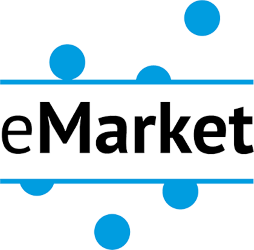
The eMarket platform enables match making between suppliers of recovered nutrients and potential end-users looking for secondary raw materials and products. The plattform is accessible through the ESPP website. The non-commercial plattform facilitates the market development for secondary nutrients. Interested companies, utilities, farmers and other nutrient suppliers or users are invited to register their offer or requirements online. Use and participation are free of charge with information/content given on voluntarily base. See how it works, and register as a user here. The eMarket has been developed within the P-REX project.
P-Recycling Summerschool
Students and young professionals discussed the possibilities of P-Recovery from the sewage sludge at the P-REX Summer school of September 2012 in Basel, Switzerland. The 3-day Summer school was accompanied by the i-net technology event concentrating on the P-recovery options in Switzerland.
Read more about the summer school and the technology-event at SCOPE N° 108, or at the latest Biorefine bulletin.
Full presentations of the technology event can be found here.
Sustainable Phosphorus Visions
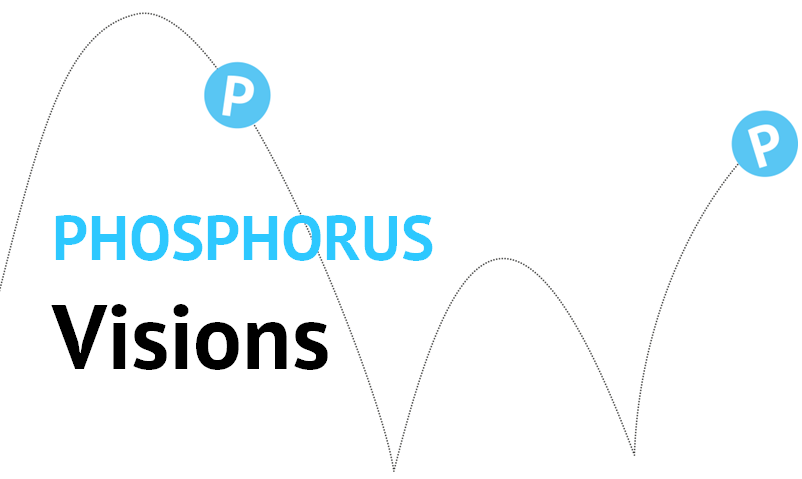
The ESPP’s call for texts received 110 contributions. The selection here is considered to best reflect the text call objective of ‘pathways to address the phosphorus challenge’. The articles present a wide range of ideas and opinions under categories ‘society‘, ‘policy‘, ‘recycling‘ and ‘agriculture‘.
Raw Materials Covenant for Phosphorus approved
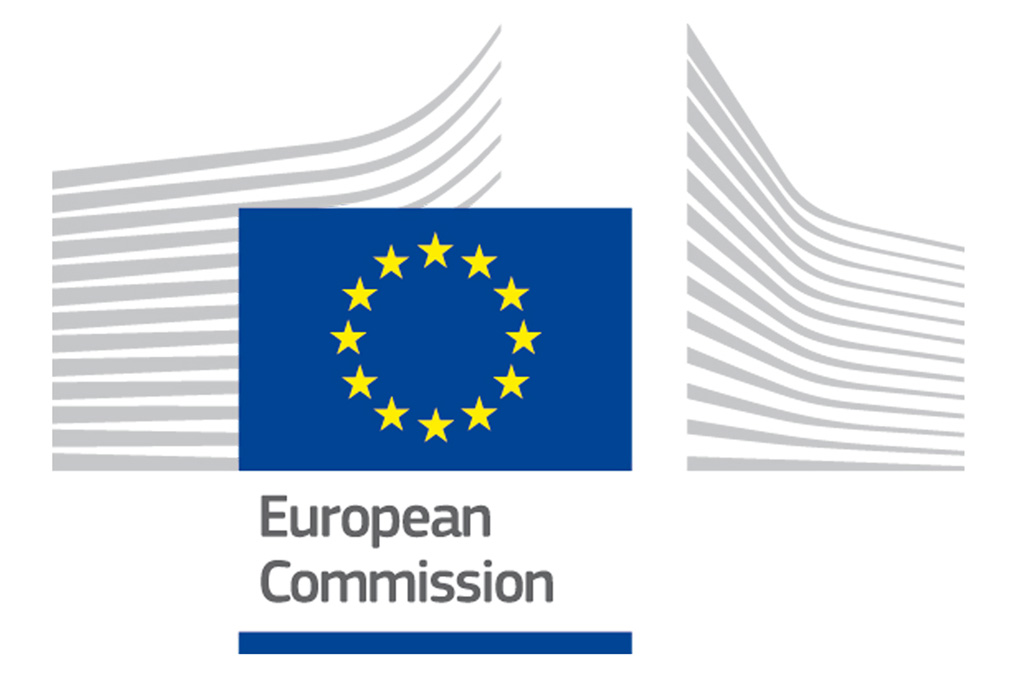
2/4/2014: The European commission has approved the “Commitment” for a Raw Materials Covenant (RMC) for a Circular Economy, taking local phosphorus recycling, reuse and efficiency as a leading example.
The Covenant is organised by ACR+ (Association of Cities and Regions for Recycling and sustainable Resource management www.acrplus.org ) and EPE (European Partners for the Environment www.epe.be ) and brings together cities and regions across Europe committed to implement the EU’s ‘EIP Raw Materials’ through efficient use of natural resources in a collaborative economy at territorial level, including resource efficiency agencies, new business models, local value chain cooperation, Business Clubs and “Benchmarks of Excellence”. Large companies and local businesses, farmers, utility companies, Poles of Excellence and other stakeholders will be involved.
Local sustainable phosphorus management will be a flagship project for the RMC Covenant, and the ESPP (European Sustainable Phosphorus Platform) will assist cities and regions in defining guidelines for local policies, tools and objectives for phosphorus flow assessment, reuse and recycling and use efficiency.
Participating cities and regions already include: Ile de France, Lapland, Athens, Alsace, Brittany Region (Bretagne), Rhône-Alpes, Lombardy, and others are invited to now join the project in preparation for the formal Covenant signature with the EU later this year.
